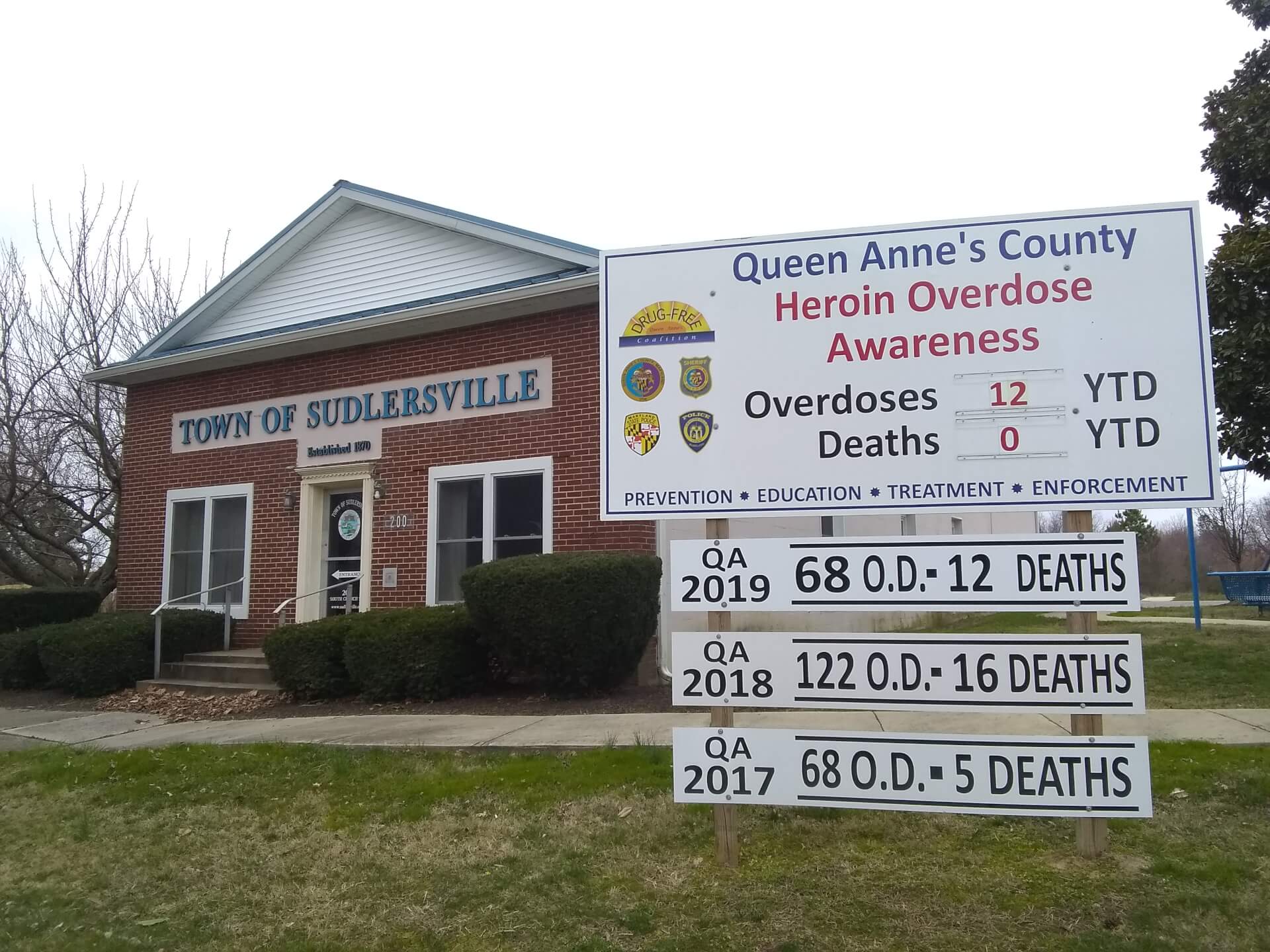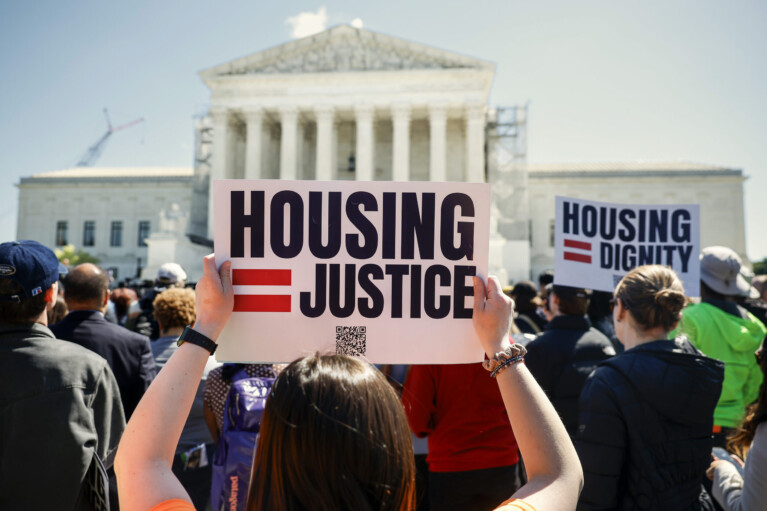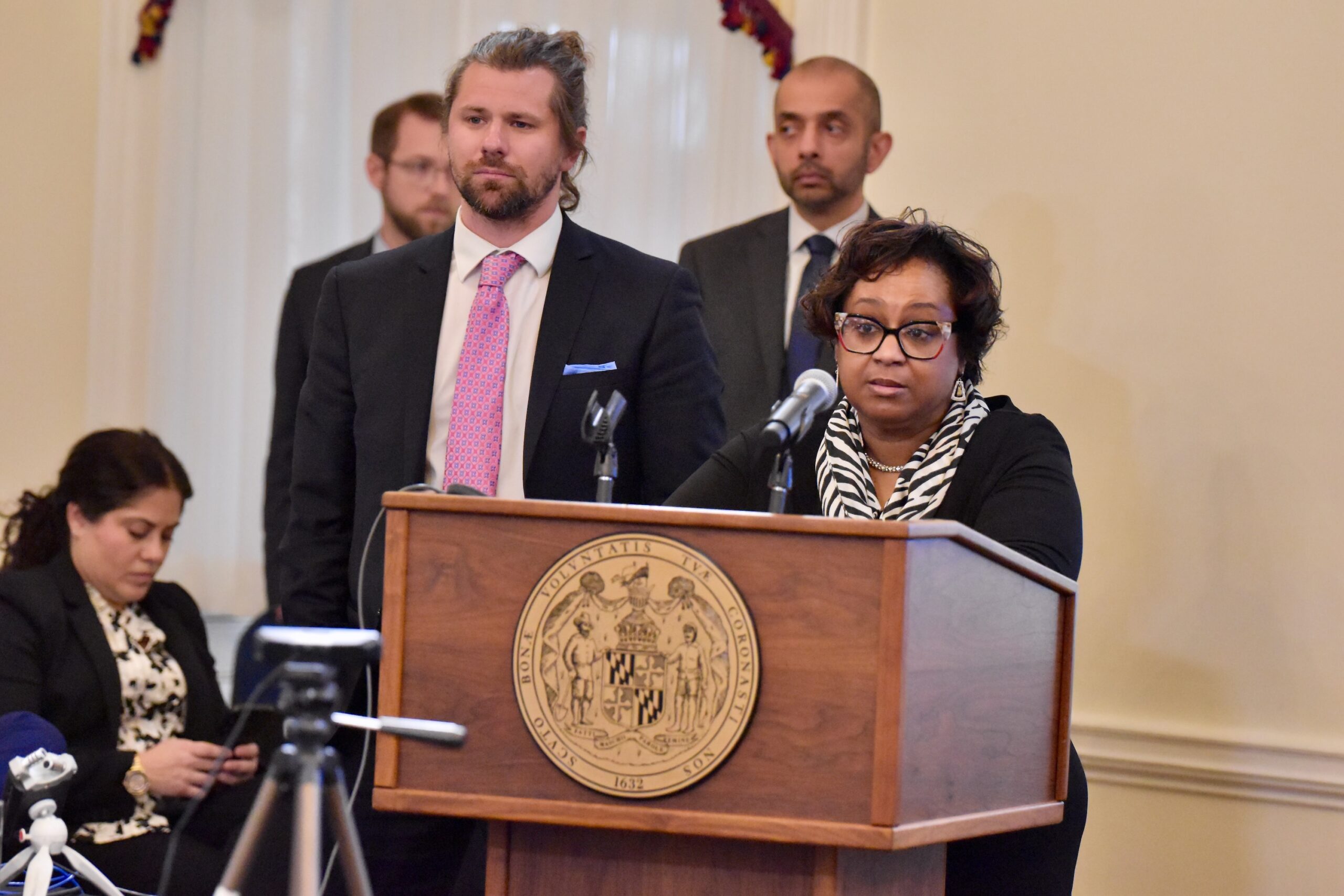Despite Furor, Eastern Shore Town Approves Zoning for Possible Immigrant Detention Facility

When residents of the Town of Sudlersville joined a virtual commissioner’s meeting at 6:30 p.m. last Wednesday, they could see Town Commission President Ron Ford in a mask and gloves seated next to Commissioner Charles Leager — also masked — at a long, deep brown table. Besides two other commissioners and the town lawyer and clerk, the town hall was empty.
Located about 50 miles east of Annapolis in Queen Anne’s County, Sudlersville had a population just below 500 as of the 2010 census. Perhaps its biggest claim to fame is being the birthplace of 1930s Hall of Fame baseball player Jimmie Foxx.
Sudlersville’s area extends 1.5 square miles, centered at the intersection of Main Street and Church Street. The Calvary Asbury United Methodist Church is just north of the main intersection, across the street from the machine shop owned by Ford. Some of Sudlersville’s other key features include a PNC Bank, a post office and a one-story library about the size of an average single-family home.
Some 450 students from the town and neighboring communities attend Sudlersville Middle School, in a building that opened in May 2012. Beyond the two lane streets and quaint rows of houses and shops, the verdant expanse of Eastern Shore fields surround the town.
Last Wednesday night, as the state remained on lockdown due to COVID-19, the commission passed a zoning ordinance that would allow a private entity to build a detention facility for immigrants in the town. Commissioner Larry Leonard cast the sole dissenting vote.
On its own, the ordinance would have been contentious.
But as residents knew, the chief prospects for where such a facility might be built lay on empty plots of land behind either the town’s elementary school, or their fairly new middle school. All participants voiced opposition to the ordinance during the meeting’s comments session before the vote, and several condemned the vote afterwards.
Suzanne Harris, owner of a Charles Street home where her uncle lives, said the commissioners’ actions were “reprehensible. I cannot believe that you went against everyone who elected you. I am sorry that you have been elected to represent us.”
Faye Williams, who owns a home on South Church Street, said, “I guess you’re not paying attention to what’s going on in the United States right now, where people can’t work, don’t have jobs, and don’t have money coming in… You’re not listening to any of us.”
She continued to press Ford on when they could expect groundbreaking to occur, and criticized the fact that representatives from the firm operating the possible detention facility had never appeared before the town’s planning commission.
Williams’ critiques prompted Ford to groan, “Thank you, I’m done. Good night!” He leaned back in his chair, exasperated.
Leager explained that despite vehement public opposition, the town was desperate for cash and needed to explore possibilities. “For years, this town has not been open for business. So with this ordinance, it would actually say the door is now open.”
The ordinance’s final vote and approval were months in the making.
Commissioner David Ruffner confirmed in an interview with Maryland Matters that he and Ford took a trip to Farmville, Va., last year. They went to survey an existing detention facility in that town operated by Immigration Centers of America, a private firm specializing in detention for individuals who have committed civil offenses.
“It almost looked like a Bass Pro Shop, except it had an extra fence around it,” Ruffner said of the Farmville facility. He mentioned that he and Ford stopped by a restaurant some 10 minutes’ walk from the detention center, and no diners in the establishment knew it was there.
This kind of facility “just seems like it’s something to look into to help us out,” Ruffner said.
Town officials believe such a facility could create about 250 jobs.
A June 2019 financial audit of Sudlersville indicated the town had $4.7 million in long-term debt, which Town Attorney Thomas Yeager said via email stemmed from a “capital project, such as a water or wastewater treatment plant.”
The document also showed Sudlersville had $5.2 million in total liabilities. According to Yeager, these included the long-term debt, as well as unpaid bills to the town’s engineer, KCI Technologies, and water and wastewater treatment plant operator, Maryland Environmental Service, a nonprofit quasi-governmental agency.
Multiple sources confirmed the town completed an overhaul of its drinking and wastewater systems prior to the Great Recession in 2008. Residents expected housing development would take place in Sudlersville after the infrastructure improvements. But as the housing market collapsed, development fell through, and the town was left with millions of dollars in debt.
“The degree to which [their] expenditures exceeded revenues is fairly extraordinary,” said Jim Peck, a research specialist with the Maryland Municipal League.
The town’s revenues for fiscal year 2019 were just $640,000.
“I’m sure [residents will] probably try to vote all of us out,” Ruffner said in reference to the town’s elections this year, which were originally scheduled for May, but have been postponed to July 27 due to the COVID-19 pandemic. He and Ford are up for reelection.
“But we’re there trying to save the town,” Ruffner insisted.
‘Every single person was opposed’
When the ordinance was debated in a public hearing at the town commissioners’ meeting Jan. 8, residents unanimously voiced opposition to the measure. The town minutes from that day gauge the public’s mood plainly: “Stating for the record not one person of the public was in favor of Ordinance 2019-05,” as the zoning ordinance is officially known.
Sergio España, a director of engagement and mobilization with the ACLU of Maryland, attended the Jan. 8 meeting. In an interview with Maryland Matters, he recounted how “the room was packed.” He said about 60 people were at the meeting.
“Every single person was opposed to it,” España said, and the fire department was especially concerned. “They didn’t want to be stained by [this facility], and had concerns for the safety of their families if something happened.”
The minutes detailed how residents opposed language specific to a private detention facility for immigrants in the ordinance. Leonard made a motion to reject the ordinance Jan. 8, which was not seconded.
Yeager wrote via email that according to the town’s charter, commissioners had 60 days to either pass the ordinance as written, pass it as amended, reject it, or defer the ordinance’s consideration to a later date. Given the scrutiny Ordinance 2019-05 was generating, Yeager recommended the commission defer it for a later date and allow the public to participate.
By the town commission’s next public meeting Feb. 5, commissioners had amended the language of the ordinance and voted to send it to the Sudlersville planning commission for approval.
Planning Commission Chairwoman Sue Elter wrote in an email to Maryland Matters that commissioners revised the ordinance’s language so that any detention center built in Sudlersville could not be used to house criminals, but rather, only those “guilty of civil offenses.”
According to Elter, the planning commission’s role was only advisory; commissioners crafted the ordinance outright during its entire process. The planning commission approved the ordinance’s new language in February, and sent it back to the commissioners, who then agreed to hold a final vote on May 6.
Immigrants’ rights groups take notice
As the ordinance gained traction, immigrants’ rights groups in Maryland and the greater Washington, D.C., region began to take an interest in Sudlersville.
Members from area civil rights groups agreed that language referring to individuals guilty of “civil offenses” was a thinly veiled reference to undocumented immigrants, who may be charged with a civil violation for either crossing the U.S. border without authorization or overstaying their visa. Meanwhile, those charged with criminal violations are typically housed in prisons or jails.
The Rev. Charlene Zellmer — a Bethesda-based interfaith minister and member of the Congregation Action Network who partners with immigrants’ rights activists — told Maryland Matters in an interview that “In our country, to be detained for a civil offense, in 99% of cases, that would mean that you made the offense of crossing the border without documents.”
She noted that in places where Immigration and Customs Enforcement partners with local authorities, individuals may be “brought in on strange issues like a broken tail light,” and called these specialized detention centers “de facto jails” where “civil rights and human rights are significantly curtailed.”
Maryland Against ICE Detention — an umbrella group of immigrants’ rights activists which includes the ACLU of Maryland and the Congregation Action Network — held an information session on detention centers at Calvary United Methodist in Sudlersville Feb. 29. The event featured Zellmer, other clergy members and doctors who had tended to detainees.
Tim Rothermel, a volunteer with the ACLU of Maryland, recounted the meeting in detail during an interview with Maryland Matters. He described the session as having taken place in the church’s parish hall, which was about the size of a small school cafeteria.
Rothermel said the session started with information from doctors, religious leaders and reading of an anonymous testimony from a detainee at the Farmville facility at 3 p.m. that day. At about 3:10 p.m., he recalled Ford joining the session.
The main information session was followed by a question and answer round, according to Rothermel. He said that some 10 minutes into the Q&A, Ford got up and began making his way toward the exit at the back of the room.
“‘Sorry you people don’t want this [facility], but it’s still going to happen because it’s the only way to move forward for us,’” Rothermel recalled Ford telling attendees on his way out. But before Ford reached the exit, Rothermel said a female resident got up and blocked his way out of the church.
He remembered the woman yelling at Ford, telling him that her children attended school in the town, and she didn’t want this kind of facility anywhere near them. Ford continued moving toward the woman, who refused to get out of his way, according to Rothermel. As they got within a few feet of each other, he said Ford shoved the woman on the shoulder, prompting attendees including Rothermel to pull them apart and allow Ford to exit.
Rothermel said that as Ford was walking to his truck in the church’s parking lot, he turned around and warned, “‘Don’t think I wouldn’t hit her.’”
When interviewed at his machine shop March 12, Ford denied having had a physical altercation with the woman. “There was no [altercation],” Ford said. “I do not tell a lie… If you’ve heard the truth in your life, you heard it tonight.”
But four eyewitnesses — including Rothermel — who were present at the meeting and agree that the incident took place. The details in their accounts were consistent with Rothermel’s. Jay Falstad, executive director of the Queen Anne’s Conservation Association, said in an interview the altercation was “witnessed by at least 20 people.”
“I thought that if [Ford] didn’t resign on his own after that episode, he should be forced to resign,” Falstad observed. But “nothing seems to have come of it.”
As Maryland took increasingly aggressive measures to combat the coronavirus, Sudlersville’s skirmishes over Ordinance 2019-05 retreated from sight. But their battle lines had been drawn, and as spring wore on, it became more likely the town commission would pass this measure despite widespread resident disapproval.
‘I’m trying to do the right thing for the town’
Ford was adamant that his support for the ordinance stemmed from a sense of obligation. “I’m trying to do the right thing for the town,” he said. “Our utility rates are higher than other towns’ because of our new water system.”
Ford argued that “If [immigrants] are legal, they shouldn’t have a problem with [the facility].”
Speaking at his machine shop, he added, “The house next door to here is full of Guatemalans. They’re the best neighbors I’ve ever had.” He also praised the Trump administration’s travel restrictions in response to COVID-19, saying, “We need to guard our borders. I know this coronavirus thing didn’t come from the south, but who knows what else they could be bringing in?”
Leonard — who cast the single vote to reject the ordinance Wednesday — insisted that he had the town’s best interests at heart.
“The feedback from the community is no,” he said. Leonard criticized the fact that no one from Immigration Centers of America (ICA) had come to Sudlersville to present a plan to the town, and pointed out that “it’s behind a school. That’s why the public don’t want it.”
He said that even if the current commission did pass the ordinance, “Anything that’s passed can be overturned within six months no problem… Once the election goes [through], I’m going to push for us to have it overturned within 60 days.”
The remaining town commissioners, Carrie Comegys and Charles Leager, did not respond to multiple requests for comment prior to Wednesday’s vote.
Future is unclear
Even with the ordinance approved, however, construction of the detention facility remains uncertain.
“There’s really nothing going on,” ICA spokesman John Truscott said in an interview. “There’s no [request for proposal] to respond to. I think during this coronavirus crisis everything has been put on hold anyway, so nothing has moved forward.”
Truscott mentioned separating immigrants without criminal records into detention facilities and away from jails with convicted criminals as a priority for ICA.
But España suggested ICA was at least considering Sudlersville as a future possibility. “It’s clear that there’s a lot of public awareness of it right now, so it’s not a good time,” he said. But “if the zoning amendment is already passed, and it’s several months later, they can get it done.”
At the virtual town hall last Wednesday, Sudlersville resident Lauren McMullen expressed confusion about why the town commission had been so adamant to pass the ordinance. “Nobody in town wants it,” she said. “And if there really is nothing on the table, then it’s a moot point to vote this in regardless.”
Harris on Wednesday complained that the town would have no oversight of whether the center’s detainees were in fact there for civil offenses. “You’re not in there,” she said. “You cannot guarantee that there might be people in there despite what this ordinance says who… [committed] a crime as opposed to illegal entry into the country.”
Zellmer was concerned about the fact that ICE signed a lease for office space in Cambridge this February. The agency’s new property is about 50 miles south of Sudlersville.
“My suspicion is that once [ICE establishes] a foothold in the community, they can begin profiling [residents],” she said. Zellmer maintained that Sudlersville’s residents “don’t want a detention center in their midst… They’re trying to keep the peace in their community.”
While the arrival of a detention facility in Sudlersville is still a nebulous possibility, the commission also passed a noise ordinance at its Wednesday meeting that could pave the way for motocross racer Travis Pastrana to bring a racing arena to the north end of the town. That measure passed with much more public support than the zoning ordinance.
Falstad, who has a child attending Sudlersville Middle School, said placing the facility behind a school is “outrageous.” Latinos represent about 14% of the town’s population.
“Given the Hispanic community in the area, and given that this is for civil infractions, a child’s relative could be detained there,” he said.
Horus Alas is freelance reporter and digital designer who graduated from the University of Maryland’s master’s program in journalism in December 2019. He has edited web content for NASA’s Glenn Research Center and reported for the Baltimore Brew, Capital News Service and The Diamondback. He can be reached at [email protected].




 Creative Commons Attribution
Creative Commons Attribution